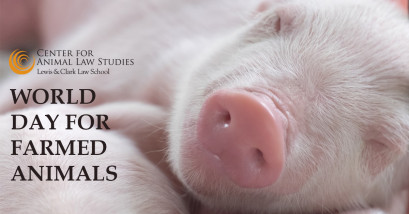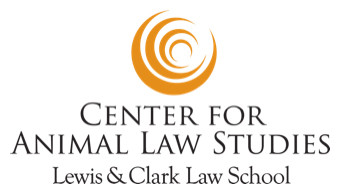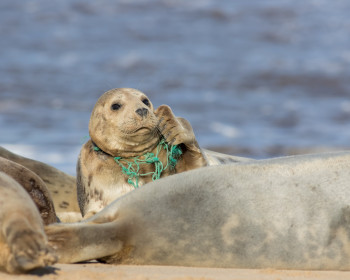World Day for Farmed Animals

At the Center for Animal Law Studies (CALS), we’re proud to be at the forefront of farmed animal advocacy every day of the year, including through our cutting-edge educational and experiential opportunities for students. Read more and watch our video to learn how we’re making a difference for farmed animals.
Students passionate about farmed animal protection have a wealth of options to expand their knowledge and hone their skills through practical work. CALS offers a unique course on Industrial Animal Agriculture Law, taught by Professor of Practice Joyce Tischler, a trailblazer who was instrumental in starting the field of animal law. Under Professor Tischler’s guidance, students examine the conditions in which farmed animals are raised, transported, and slaughtered, the policies that brought this system into existence and encourage it to expand globally, statutory and case law relevant to the farmed animal production system and the cultural values and economic pressures that underlie different legal systems’ treatment of farmed animals.
CALS also offers an advocacy oriented experiential opportunity for all students, including our new cohort of non-lawyer Master of Studies students, through our new Farmed Animal Protection Project. Taught by Professor Russ Mead, former General Counsel and Interim Executive Director for Farm Sanctuary, students have an in-class component and an out-of-class individual project. Under the guidance of Professor Mead, students create an individual project in the field of farmed animal protection law. These projects are designed to facilitate innovative approaches to advancing protections for farmed animals while training lawyer and nonlawyer farmed animal advocates.
In honor of World Farmed Animal Day, CALS Executive Director and Assistant Dean, Pamela Hart, sat down with Professors Tischler and Mead to discuss why they are passionate about education and advocacy for farmed animals and how they prepare Lewis & Clark Law students to make a difference in the lives of the 9 billion land animals slaughtered annually in the United States alone. An estimated 99 percent of these farmed land animals in the United States are raised in factory farms.
As individuals, we also have the power in our daily lives to ease the suffering of farmed animals and support a kinder, more compassionate world.
Actions to take on this World Farmed Animal Day:
- Share this blog to raise awareness for farmed animals;
- Check us out on social media and share our posts;
- Watch the interview with Professors Tischler and Mead;
- Study farmed animal protection law with us at CALS;
- Donate to CALS to support our work – as a fully self-funded nonprofit, CALS is able to provide these opportunities through the generosity of our donors;
- Consider how your personal decisions contribute to the suffering of farmed animals and how reducing or eliminating the consumption of farmed animals helps the animals, our fellow human-beings, and the planet;
- Support laws that reduce the suffering of farmed animals and that address the intersectional issues of the environment, climate, workers’ rights, social justice, and environmental racism.

More Center for Animal Law Studies Stories
Center for Animal Law Studies is located in Wood Hall on the Law Campus.
MSC: 51
email cals@lclark.edu
voice 503-768-6960
Center for Animal Law Studies
Lewis & Clark Law School
10101 S. Terwilliger Boulevard MSC 51
Portland OR 97219

